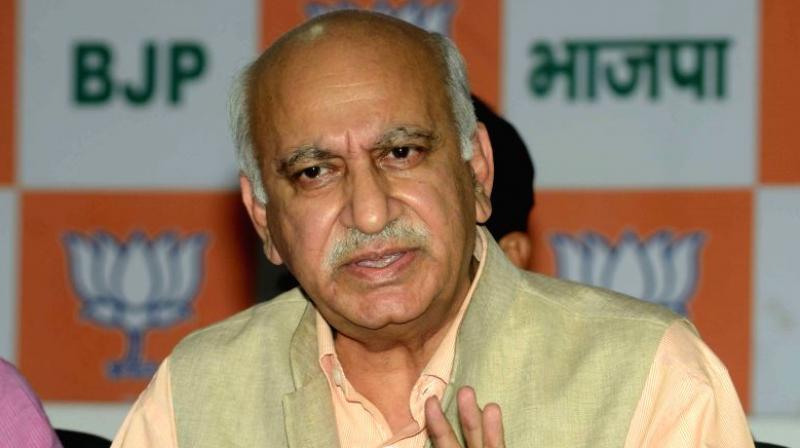India taking 'urgent steps' to counter radicalisation, will hold global meet: Govt
MJ Akbar also expressed disappointment over the UN not coining a definition on what exactly terrorism means

New Delhi: The government on Thursday said India is taking "urgent measures" to counter radicalisation and will soon hold an international conference on the issue that distorts reality and the message of Islam.
Delivering his key note address during an international seminar organised by country's premier counter-terror force NSG here, Minister of State for External Affairs M J Akbar said India was surprised as to why the United Nations and its member countries have been held back by "some limited tactical" reason to define the precise meaning of terrorism.
"... we protect human rights when we eliminate terrorism.
This is a debate which goes on and on and on that we, those who seek to eliminate terrorism, are somehow infringing human rights, when the greatest threat to human rights is the terrorist. Is there anybody, who is sane, and who can challenge this? Is there anybody, who is sane, who can argue with this?
"In fact, even in the Holy Koran it is written that the eliminator of a 'fasadi' (one who spreads mischief), fasad is a word commonly used in India now, elimination of one 'fasadi' is equivalent to saving the whole community. And it is very true, I mean, this metaphor is so perfectly appropriate to our country," Akbar said while addressing the top brass of counter-terror officials from India and about a dozen foreign countries.
He said while the country was not witnessing a flood of Indian Muslims going towards radicalisation, the government does recognise the need to "take urgent measures to counter and protect the spread of terrorism and radicalisation."
"We are taking the lead in discussing radicalisation, in searching and finding out ways in order to challenge it because this has to be fought not only at the level of what you (security agencies) do it, but also at the level of ideas.
"And, we hope that we will be able to hold an international conference on radicalisation very soon. We have, therefore, called upon all countries to work together to expedite the adoption of a draft comprehensive convention on international terrorism in UNGA (United Nations General Assembly) without any further delay," Akbar said.
The minister also expressed India's disappointment over the UN not coining a definition on what exactly terrorism means to the globe.
"I don't think anyone in the world denies the menace of terrorism. Why is it that for the last 20 years the UN has not been able to find a definition. Nations must ask themselves how can you fight an enemy if you do not have clarity about the enemy and how can you have clarity if you do not have definitions?
"This coy approach to such a menace is not serving the world very well ... the UN itself is a term from the second Word War (and) it was created for the allies, there was clarity. Why is there no clarity in this world?," Akbar said, adding radicalisation by terror groups "distorts reality and the message of Islam”.
Akbar said at forums like the UN "some limited tactical reason consistently seems to prevent the nations, or some important nations who are in the body, to take the necessary important and vital step to define what precisely is this enemy."
He stressed that the terror groups do not operate to only perpetrate death but have important political objectives.
"It is extremely important to remember that the true costs of terrorism has nothing to do with dollars, with rupees or it has nothing to do with finances except of course in terms of the fact that terrorism remains perhaps the biggest threat to all economies.
"But the true cost of terrorism lies in two terms...it is very naive to believe that a terrorist organisation like DAESH (ISIS) or Lashker-e-Taiba or Jaish-e-Mohammed do not have a political objective. They are not simply random militia groups of the kind that we have seen. They have very important political objectives," he said.
DAESH or the Caliphate is about non-recognition to the nation state, he said.
"In my faith Islam, conflicts over politics arose from the very beginning after the death of the Prophet and that's why we have the Shia-Sunni conflict. If religion was sufficient as the basis of nationalism then why would there be 22 Arab states? Yet the dream keeps on renewing itself (and) particularly at the time when other alternative models for political mobilisation seem to have failed," Akbar said.
The minister added that the objective of terrorism is to "create fear in plural societies so that walls can be created between different ethnic groups, different religions who have lived as equals and who continue to do so under Constitutions and under philosophies that believe in equality as the basis of civilisation," he said.
He also underlined the commitment that the country has made to counter terrorism.
"India is strongly committed to combat this menace in all its forms and manifestations. We strongly believe that those who provide safe havens and training to terrorists are no less guilty. Complacency, hypocrisy or duplicity towards the godfathers of terrorism is an invitation to disaster.
"We have therefore ascertained that our fight against terrorism should not only seek to eliminate terrorists and disrupt their organisations and their networks but should also identify and take strong measures against states who encourage, support and finance terrorism and provide sanctuary to terrorists and terror groups and falsely extol their virtues. There should be no glorification of terrorists as martyrs," he said.

